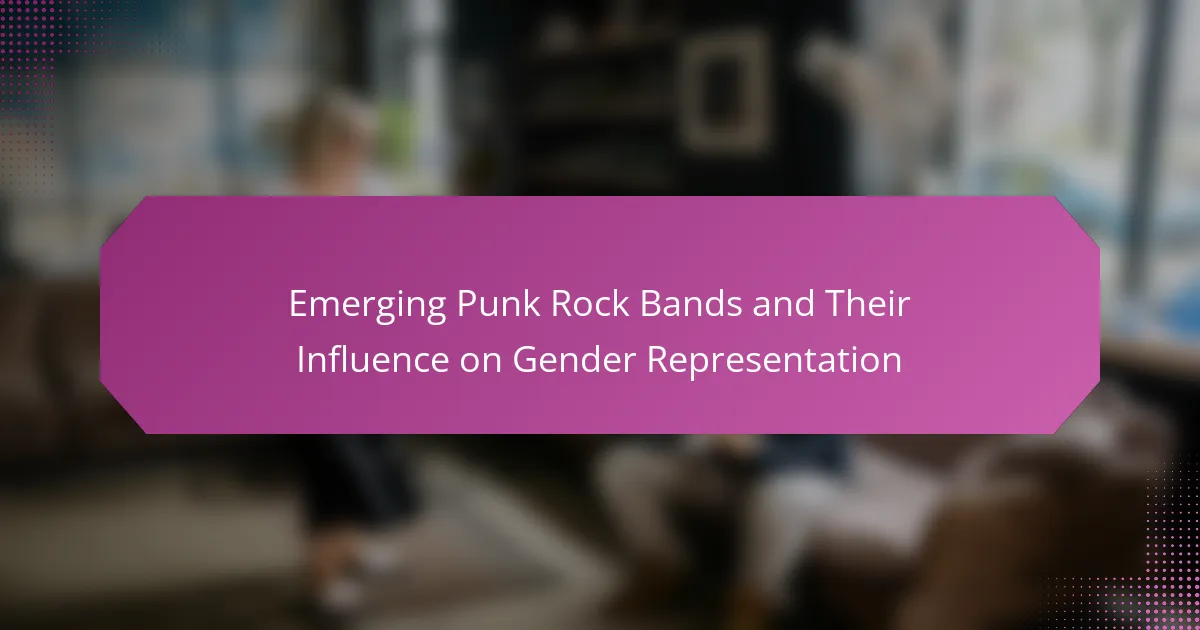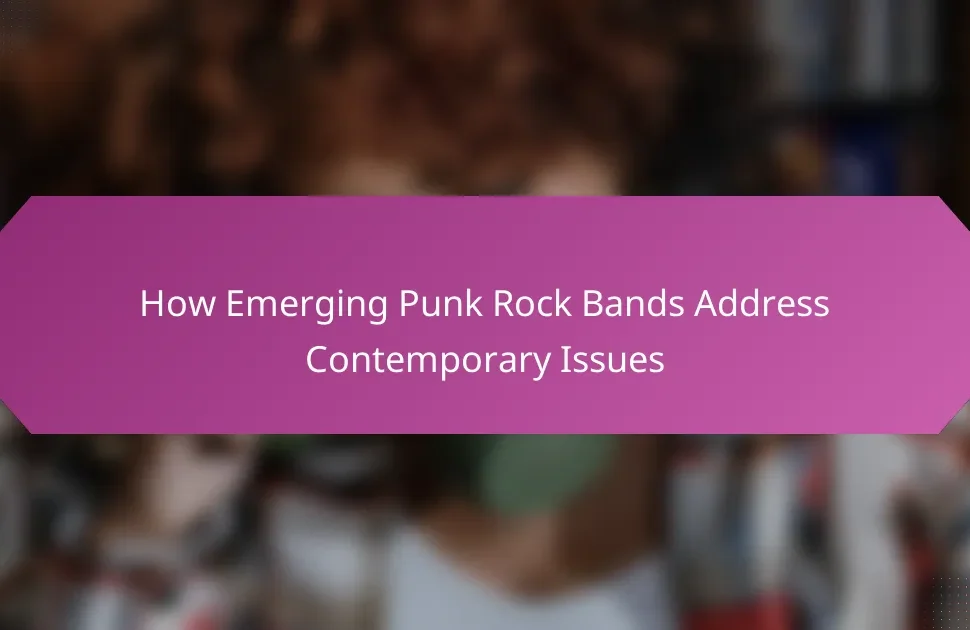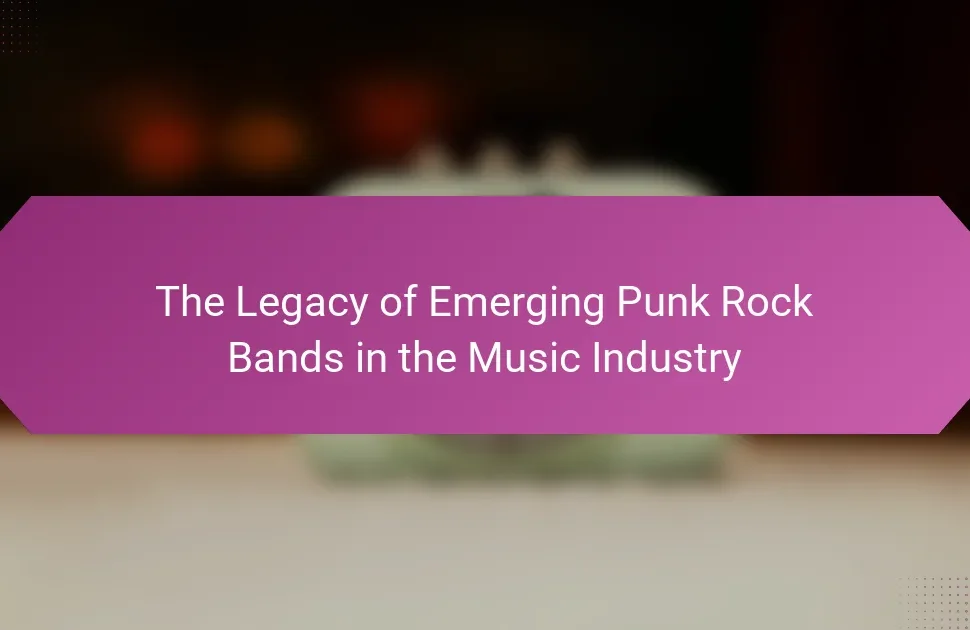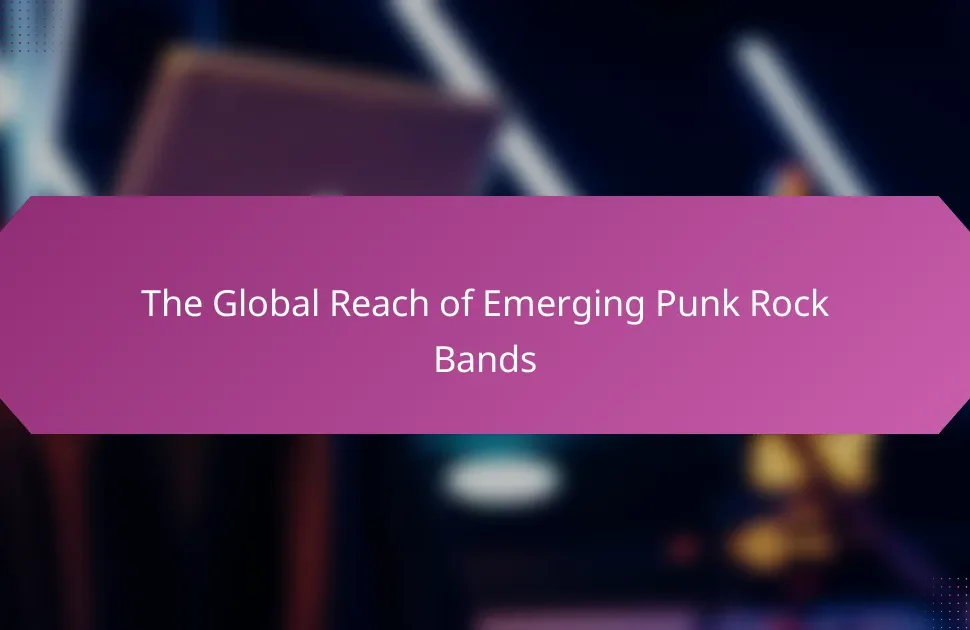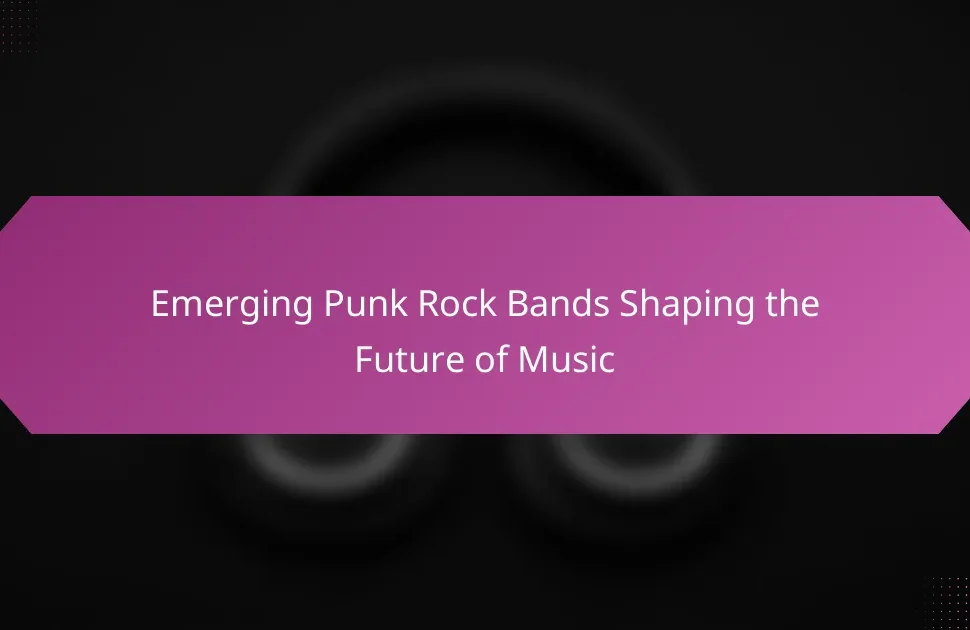Emerging punk rock bands are reshaping gender representation in music by challenging traditional norms and promoting inclusivity. They feature diverse lineups and address gender identity through empowering lyrics. This shift encourages fans to embrace their identities while fostering dialogue around societal injustices. Bands like PWR BTTM and Dream Wife exemplify this transformation, highlighting the importance of diverse voices in the punk scene.
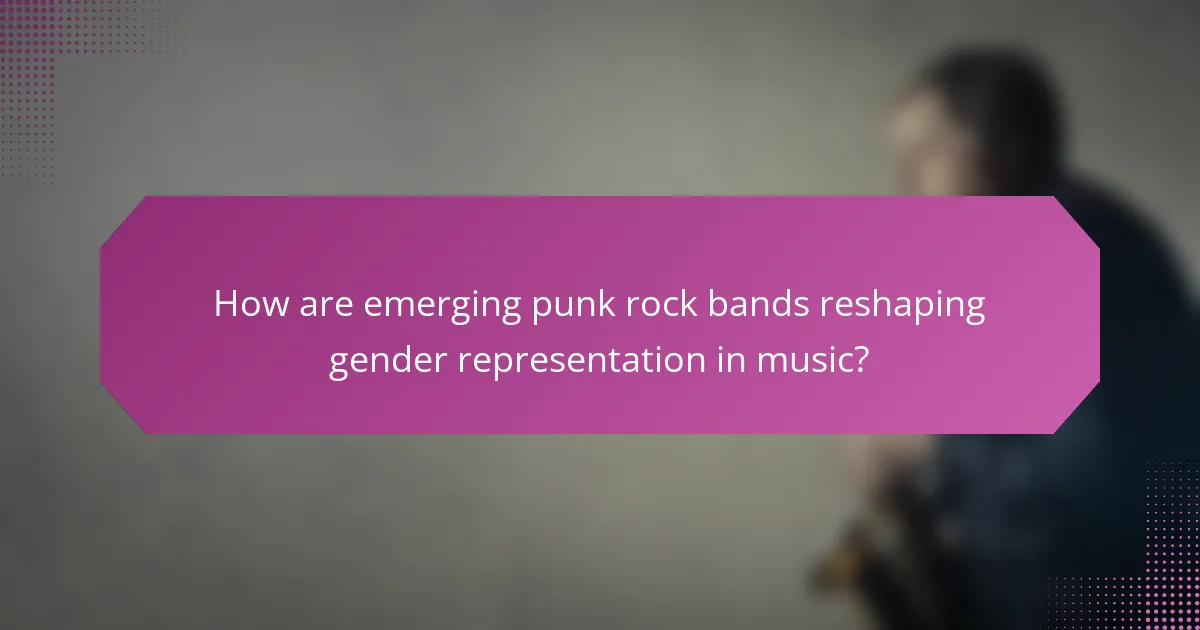
How are emerging punk rock bands reshaping gender representation in music?
Emerging punk rock bands are significantly reshaping gender representation in music by challenging traditional norms. These bands often feature diverse lineups and promote messages of inclusivity. For instance, many female-fronted punk groups are gaining visibility, empowering women in a genre historically dominated by men.
Additionally, bands are addressing gender identity and expression through their lyrics and visuals, fostering a more accepting environment. This shift encourages fans to embrace their identities and reject stereotypes. The rise of non-binary and genderqueer artists within punk further exemplifies this transformation, showcasing unique perspectives and experiences.
As a result, emerging punk rock bands are not only redefining the genre but also influencing broader cultural conversations about gender and representation in music.
What influences do punk rock aesthetics have on gender identity?
Punk rock aesthetics significantly influence gender identity by challenging traditional norms and promoting fluidity. Emerging punk rock bands often embrace diverse gender expressions, fostering acceptance and visibility. This genre encourages individuals to explore their identities freely, often leading to a redefinition of masculinity and femininity. For example, bands like Against Me! and PWR BTTM have actively engaged with gender issues, inspiring fans to embrace non-binary identities. Such representation in music empowers listeners, creating a more inclusive cultural landscape.
Which emerging bands are leading the charge for gender inclusivity?
Emerging punk rock bands are increasingly promoting gender inclusivity through their music and community engagement. Bands like Dream Wife and The Regrettes challenge traditional gender roles and advocate for equality. Their lyrics often address issues of identity and empowerment, resonating with diverse audiences. Additionally, these bands create safe spaces at concerts, fostering an environment where everyone feels welcome. This commitment to inclusivity not only shapes their fan base but also influences the broader punk rock scene.
How do regional differences affect the portrayal of gender in punk rock?
Regional differences significantly shape how gender is portrayed in punk rock, influencing themes, styles, and band dynamics. In the UK, punk often challenges traditional gender roles through confrontational lyrics and aesthetics. Conversely, in the US, the focus may lean towards individualism and personal narratives, affecting gender representation.
Emerging punk bands in various regions reflect local cultural contexts, leading to unique expressions of gender. For instance, bands from Latin America may incorporate feminist themes influenced by socio-political climates. This diversity enriches the punk genre, showcasing varied perspectives on gender across different cultures.
Additionally, the rise of social media amplifies these regional voices, allowing bands to share their narratives globally. This connectivity fosters a broader dialogue on gender representation, encouraging more inclusive portrayals. Overall, regional differences play a crucial role in shaping the evolving landscape of gender in punk rock.
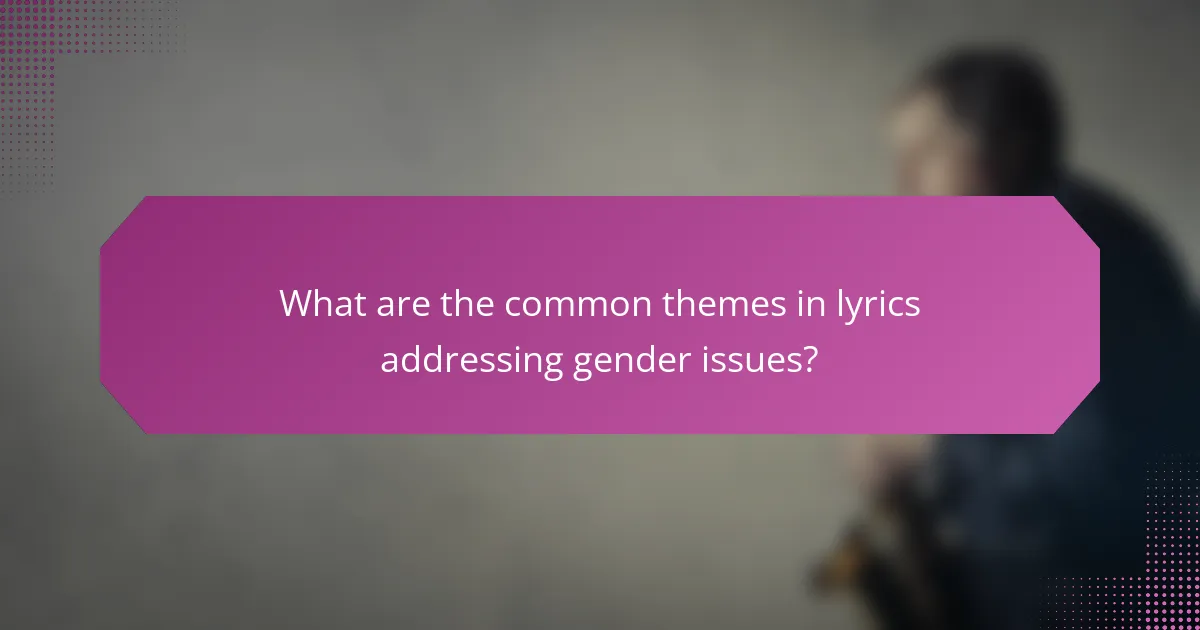
What are the common themes in lyrics addressing gender issues?
Emerging punk rock bands often address gender issues through themes of empowerment, equality, and resistance to stereotypes. These bands challenge traditional gender norms and advocate for inclusivity in their lyrics.
Many lyrics emphasize personal experiences related to gender identity, highlighting struggles and triumphs. For example, bands like PWR BTTM and Against Me! have gained attention for their candid discussions about gender fluidity and feminism.
Additionally, the raw energy of punk rock serves as a platform for discussing societal injustices, making it a unique space for marginalized voices. This genre’s DIY ethos encourages self-expression and activism, reinforcing the message of gender equality.
Overall, emerging punk rock bands play a crucial role in reshaping gender representation, fostering dialogue, and inspiring change within and beyond the music scene.
How do emerging punk rock bands address feminism in their music?
Emerging punk rock bands often address feminism by incorporating strong feminist themes in their lyrics and performances. They challenge traditional gender roles and advocate for equality. Many bands use their platforms to promote awareness of women’s rights and social issues. For example, the band “Pussy Riot” combines punk rock with feminist activism, highlighting gender-based violence and discrimination. This approach not only resonates with their audience but also fosters a community that supports gender representation in music. Emerging bands are redefining punk by embracing inclusivity and encouraging conversations around feminism.
What role do male artists play in supporting gender representation?
Male artists play a crucial role in supporting gender representation by challenging stereotypes and amplifying diverse voices. Emerging punk rock bands often embody these values through their music and public personas. They create spaces for dialogue about gender issues, fostering inclusivity within the genre.
For example, bands like Idles and Dream Wife address gender dynamics directly in their lyrics and performances, promoting equality and respect. Their influence extends beyond music, inspiring fans to engage with gender representation actively. This engagement helps shift cultural perceptions and encourages broader acceptance of diverse identities in punk rock and beyond.
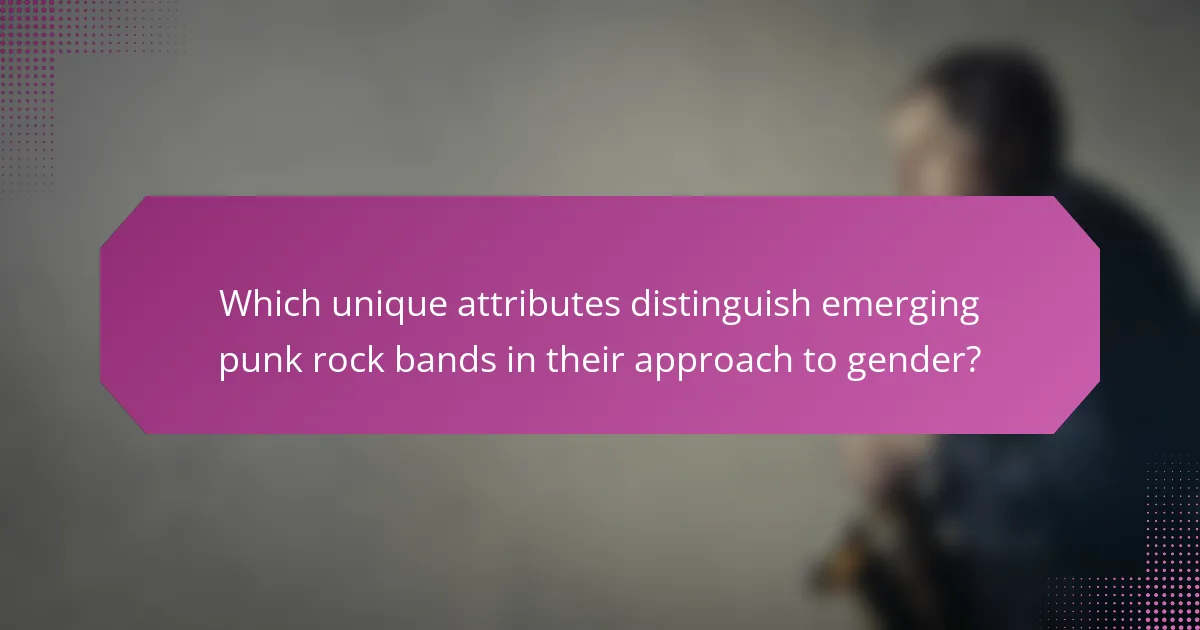
Which unique attributes distinguish emerging punk rock bands in their approach to gender?
Emerging punk rock bands distinguish themselves through innovative gender representation, often challenging traditional norms. They emphasize inclusivity, showcasing diverse identities and experiences. Many bands adopt gender-neutral language and promote female and non-binary voices, contributing to a more equitable music scene. Unique attributes include a focus on intersectionality and activism, which resonate with younger audiences seeking authenticity.
How do these bands use fashion and performance to challenge gender norms?
Emerging punk rock bands use fashion and performance to challenge gender norms by embracing androgyny and subverting traditional aesthetics. These bands often mix masculine and feminine styles, creating a unique visual identity that defies societal expectations. For instance, artists like Poppy and Gender Roles incorporate bold clothing choices and unconventional stage presence to provoke thought about gender identity. Their performances often feature elements traditionally associated with both genders, fostering inclusivity and challenging the binary perception of gender. This approach not only influences their audience but also contributes to a broader cultural conversation about gender representation in music.
What are the notable collaborations between genders in emerging punk bands?
Notable collaborations between genders in emerging punk bands often highlight creative synergy and diverse perspectives. Bands like The Regrettes and Dream Wife exemplify these collaborations, blending male and female voices to challenge traditional norms. Their music addresses gender issues and promotes inclusivity, reflecting a shift in punk’s representation. Additionally, collaborations often result in innovative sounds, merging different styles and influences that enrich the punk genre. This trend indicates a growing recognition of the importance of gender diversity in music.
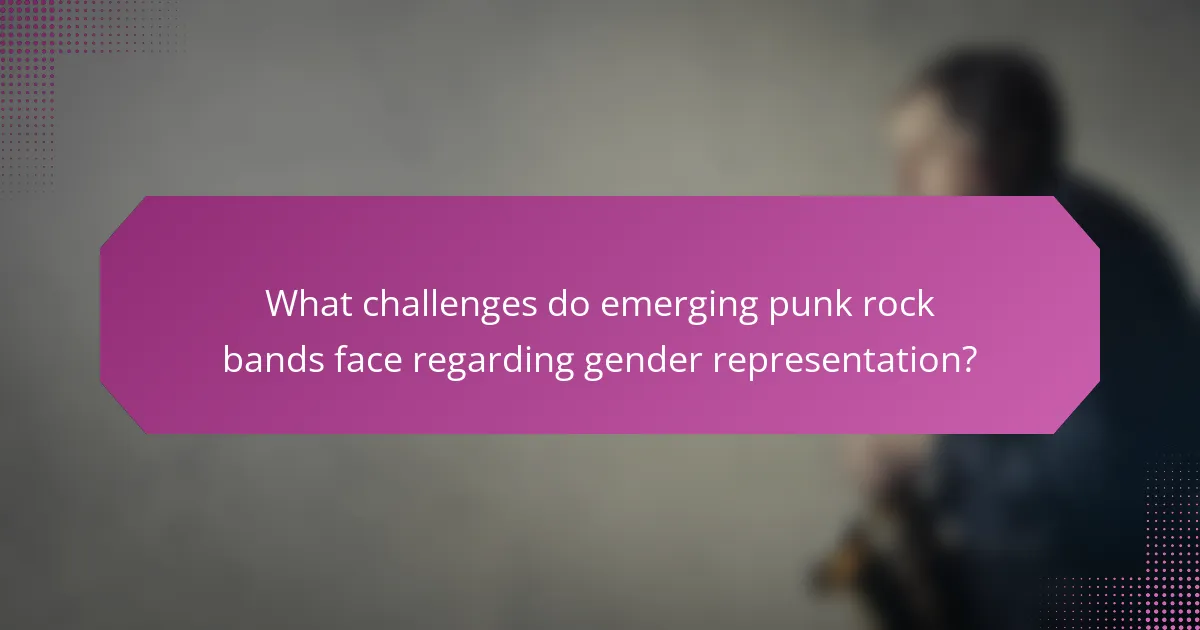
What challenges do emerging punk rock bands face regarding gender representation?
Emerging punk rock bands face significant challenges regarding gender representation, including stereotypes, limited opportunities, and industry bias. These barriers hinder diverse voices and perspectives within the genre.
Stereotypes often pigeonhole female musicians into specific roles, affecting their visibility. Limited opportunities arise from a predominantly male industry, which can restrict access to venues and festivals. As a result, female and non-binary artists struggle to gain recognition and support.
Additionally, industry bias perpetuates a cycle where male-dominated narratives overshadow diverse contributions. This lack of representation can discourage aspiring musicians from pursuing their passion. Addressing these challenges is crucial for fostering a more inclusive punk rock scene.
How do industry biases impact the visibility of female and non-binary artists?
Industry biases significantly reduce the visibility of female and non-binary artists in punk rock. These biases manifest through unequal representation in media coverage, festival lineups, and promotional opportunities. For example, studies show that female artists receive less airtime on major radio stations, limiting their audience reach. Additionally, non-binary artists often face challenges in a genre that traditionally emphasizes binary gender roles. As a result, emerging punk rock bands that prioritize inclusivity can reshape gender representation, promoting a more diverse musical landscape. Their influence can challenge stereotypes and encourage broader acceptance within the genre.
What strategies are being implemented to overcome these challenges?
Emerging punk rock bands are implementing various strategies to enhance gender representation. They prioritize inclusivity by showcasing diverse voices and experiences in their music and performances.
Many bands collaborate with female artists and activists to raise awareness about gender issues. They also create safe spaces at concerts to encourage participation from underrepresented groups. Additionally, social media campaigns amplify these messages, reaching a broader audience and fostering community engagement.
As a result, these strategies not only challenge traditional gender norms but also inspire a new generation of musicians and fans to advocate for equality within the punk rock scene.
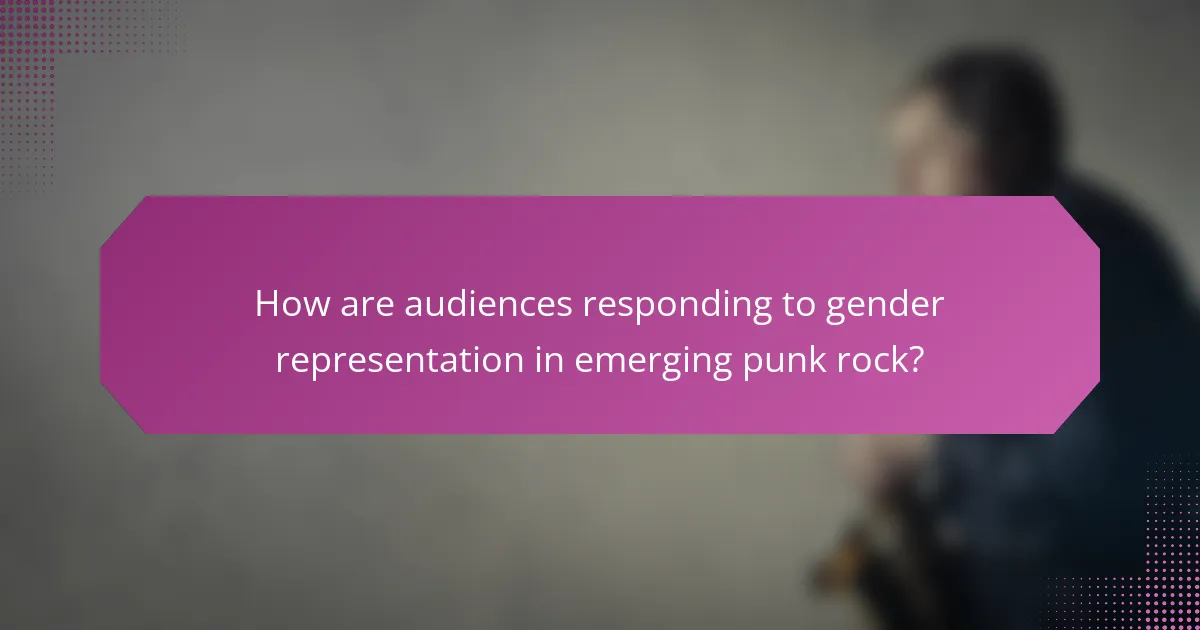
How are audiences responding to gender representation in emerging punk rock?
Audiences are increasingly supportive of gender representation in emerging punk rock, appreciating diversity and authenticity. Emerging punk rock bands often challenge traditional gender norms, showcasing a range of identities and experiences. This shift resonates with fans seeking inclusivity and representation in the music they consume. Bands like Dream Wife and Pussy Riot exemplify this trend, using their platforms to address gender issues and empower marginalized voices. As a result, audiences respond positively, fostering a vibrant community that values diverse expressions of identity within the punk rock genre.
What demographic trends are evident in the punk rock fan base?
The punk rock fan base is increasingly diverse, reflecting broader demographic trends. Emerging punk rock bands are challenging traditional gender norms, promoting inclusivity and representation. Female and non-binary musicians are gaining visibility, influencing the genre’s evolution. This shift is evident in band lineups and lyrical themes, which often address social justice and gender equality issues. As a result, the punk scene is becoming more welcoming and representative of various identities.
How do fans engage with bands that advocate for gender equality?
Fans engage with bands advocating for gender equality through active participation and support. They attend concerts, share messages on social media, and participate in discussions surrounding gender issues.
Emerging punk rock bands often use their platforms to raise awareness about gender representation. Their music and lyrics challenge stereotypes and promote inclusivity. Fans resonate with these messages, creating a community focused on equality.
For example, bands like The Linda Lindas and PWR BTTM have cultivated dedicated followings who appreciate their commitment to social justice. Fans often express their support by purchasing merchandise and attending events that align with these values.
As a result, the relationship between fans and these bands fosters a culture of activism within the punk rock scene, encouraging a broader dialogue about gender equality.
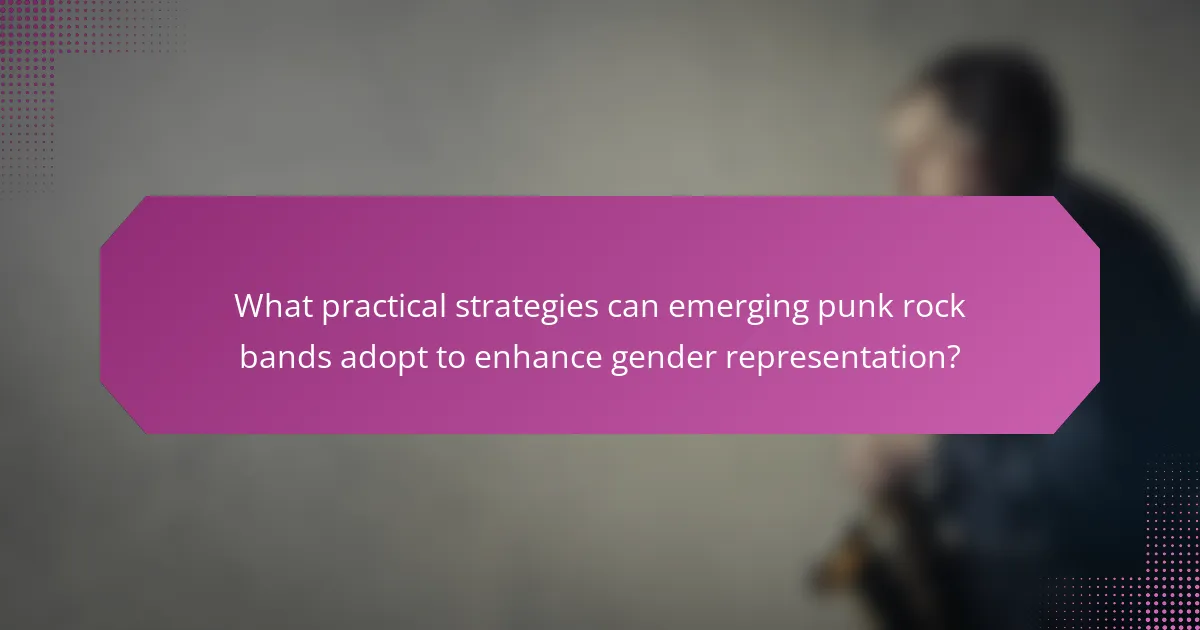
What practical strategies can emerging punk rock bands adopt to enhance gender representation?
Emerging punk rock bands can enhance gender representation by actively promoting diverse voices and creating inclusive spaces. They should collaborate with female and non-binary artists, ensuring equal representation in lineups and decision-making roles. Hosting workshops and discussions on gender issues can further engage the community and raise awareness. Additionally, utilizing social media platforms to amplify underrepresented voices can help challenge stereotypes and foster a more inclusive punk culture.
What best practices should bands follow to promote inclusivity in their music and performances?
Emerging punk rock bands should prioritize diverse representation in their music and performances. They can achieve this by collaborating with artists from various backgrounds, ensuring equitable stage time, and addressing gender issues in lyrics. Promoting safe spaces at shows fosters inclusivity for all attendees. Engaging with community initiatives can further strengthen connections with underrepresented groups.
